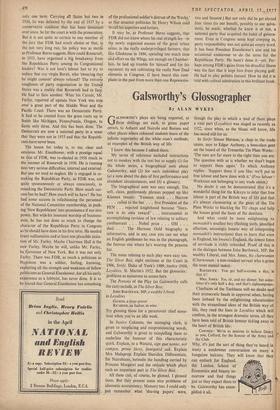Galsworthy's Glossographer
By ALAN WYKES GALSWORTHY'S plays are being exported, at three shillings net each, in green paper covers, to Ashanti and Nairobi and Borneo and other places where coloured students learn of the infinite superiority of the white man's methods, as exampleS of the British way of life.
I know this because I edited them.
My terms of reference included instructions not to monkey with the text but to supply (1) for the whole series, a biographical note about Galsworthy, and (2) for each individual play (a) a note about the date of first performance and attendant circumstances, and (b) a glossary.
The biographical note was easy enough. The soft, clean, gentlemanly phrases popped up like Kleenex tissues : 'Yeoman stock . . . Harrow . . . called to the bar . . . first President of the PEN . . . rejected knighthood because "litera- ture is its own reward" . . . instrumental in accomplishing revision of law relating to solitary confinement . . . Nobel prize . . . OM . . . died. . . .' The Hermon Ould biography is informative, and in any case you can see what an English gentleman he was in the photograph, the famous one where he's wearing the panama hat.
The notes relating to each play were easy too. The Silver Box, eight matinees at the Court in 1906, Strife, Duke of York's 1909, Justice 1910, Loyalties, St. Martin's 1922. But the glossaries : Problems as numerous as scenes here.
The Persons of the Play (as Galsworthy calls the cast) include, in The Silver Box, JOHN BARTHWICK, MP, a wealthy Liberal in Loyalties GILMAN, a large grocer RICARDOS, an Italian, in wine.
Try glossing those for a paramount chief some- . time when you've an idle week.
In Justice Cokeson, the managing clerk, is given to misplacing and mispronouncing words, and Galsworthy is given to misspelling them to underline the humour of this characteristic quirk. Explain, to a Watutsi, sign qua nonne, not cornpos, prime facey, fumigated oak. Explain Mrs. Malaprop. Explain Sheridan. Differentiate, for Nairobians, betwedn the handbag carried by Princess Margaret and the reticule which plays such an important part in The Silver Box.
All these can, of course, be glossed. I glossed them. But they present some nice problems of idiomatic accountancy. Memory too. I could only just remember what 'shaving papers' were, though the play in which a wad of them plays a vital part (Loyalties) was staged as recently as 1922, since when, as the Masai will know, life has stood still for us.
In Strife 'Simon Harness, a chap in the trade union, says to Edgar Anthony, a boss-class gent on the board of the Trenartha Tin Plate Works : The men are far more in the right than you are. The question with us is whether we shan't begin to support them again.' To which Anthony replies : 'Support them if you like; we'll put in free labour and have done with it.' (Free labour : Workmen not belonging to any trade union.) No doubt it can be demonstrated that it's a wonderful thing for the Kikuyu to infer that free labour is part of the British way of life and that it's always clamouring at the gates of the Tin Plate Works to blackleg the TU chaps and help the bosses grind the faces of the destitute.
And what could be more enlightening to memsahib's smallest boy (flashing teeth, unsullied affection, amusingly lunatic way of interpreting memsahib's instructions) than to learn that even in England, his bwana's England, the lowest form of servitude is richly rewarded. Proof of this is in the dialogue between John Barthwick, MP, the wealthy Liberal, and Mrs. Jones, his charwoman (Charwoman : a non-resident servant who is given the most menial tasks): BARTHWICK: You get half-a-crown a day, is that it?
MRS. JONES: Yes, sir, and my dinner; but some- times it's only half a day, and that's eighteenpence.
Chieftains of the Turkhana will no doubt nod their aristocratic heads in approval when, having been imbued by the enlightening educationists with the streamlined ideas of the British way of life, they read the lines in Loyalties which will confirm, in the strongest dramatic terms, all they have been told of British honour ticking away in the heart of British life : CANYNGE: We're as anxious to believe Dancy as you, Colford, for the honour of the Army and the Club.


































 Previous page
Previous page